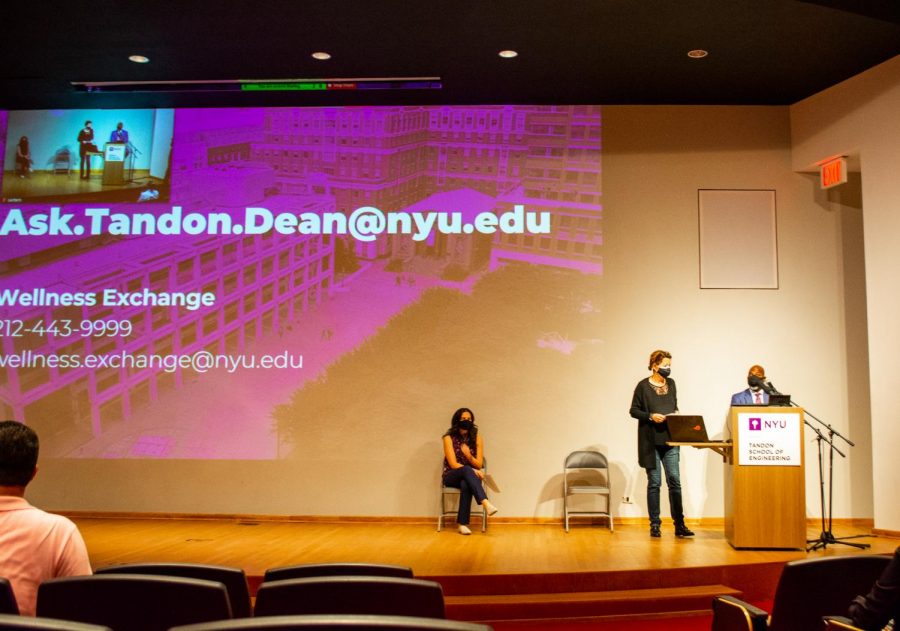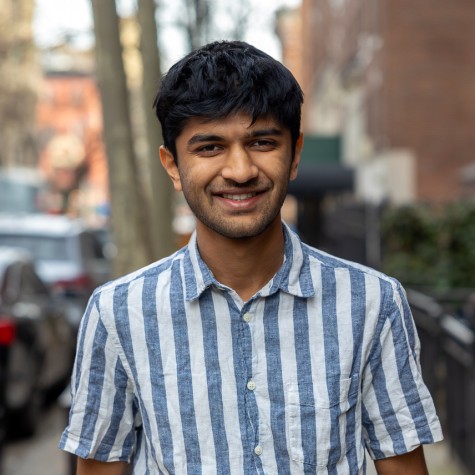At Tandon town hall, NYU confronts the aftermath of Sept. 21 shooting
Two days after a student was shot outside a campus building, the Tandon School of Engineering held a town hall addressing unanswered questions as well as the university’s self-described “communication breakdowns.”
Tandon’s senior leadership and members of the Department of Campus Safety hosted a town hall at Tandon’s Dibner Library on Sept. 23. They addressed the shooting of an NYU student outside a Tandon building, and students voiced concerns and asked questions about the shooting and the university’s communication and response. (Staff Photo by Manasa Gudavalli)
September 27, 2021
Tandon dean Jelena Kovačević and head of campus safety Fountain Walker held a town hall on Sept. 23 to address the Sept. 21 shooting of an NYU student outside of a Tandon building. The dean and vice president admitted to a range of communication errors and outlined a series of corrective measures, including the formation of a new community task force for neighborhood safety.
News of the shooting shook the university community and made headlines across New York City. The town hall was hosted by Tandon’s senior leadership and members of the Department of Campus Safety to enable students to voice their concerns about the university’s immediate response and provide a space for collective healing. An email from Kovačević to Tandon students announcing the meeting on Sept. 22 noted that a topic of discussion would be “some of the communication breakdowns during and after the shooting.”
The meeting took place at the Pfizer Auditorium in Dibner Hall and was simultaneously live streamed on Zoom. A group of approximately 30 students attended in person, with another 59 joining virtually.
Kovačević opened the meeting by acknowledging the courage of the victim and praising the student body for supporting one another in the moments following the attack. She also noted that the student who was shot decided to return to class on Thursday, only two days after the incident.
“While this was something that took place in a public area and was, as far as we can tell, not related to anyone [at NYU] in any way, it doesn’t really change the fact that it had an impact on all of us,” Kovačević said. “So many of you showed up for each other and helped move us through the events that took place.”
After a series of introductions and a brief breathing exercise conducted by Robert Taylor Jr., a program administrator at the Center for Spiritual Life, Alexandra Brinton, the president of Tandon’s Undergraduate Student Council, emphasized the student government’s commitment to advocating for increased safety.
“Your student council will do everything in our power to improve our safety on campus, so we can restore a sense of normalcy,” Brinton said. “We will work to make Tandon even better than it already is. We will get through this together.”
Kovačević then opened the floor to questions and comments from the audience — all of which were submitted anonymously using index cards.
Sayor Lonial, the associate dean for Communications & Public Affairs, said that Tandon, NYU Campus Safety, and NYU Community Engagement asked civic organizations outside the university to form a task force. The task force will communicate with local businesses and the community when similar situations arise.
“We’re not just going to say this is a city and these things happen,” Lonial said. “We want to take an active role in trying to figure out what answers are. We do want to try our best to try to come up with some solutions with our partners.”
Tandon graduate student Asad Mahmood, who was at lunch when the shooting occurred, attended the town hall and said the university answered many important student questions.
“I thought this was a safe area,” Mahmood said. “I was shocked to hear what happened, but I’m hoping this is a one-time thing and it doesn’t happen in the future.”
During the Q&A session, Walker said that the language used in the text alert to students should have been more specific — NYU only warned students about police activity in the MetroTech area, and did not specify that gunshots had been fired. He assured the audience that Campus Safety would revise its procedures to convey more detailed information in the future.
“We definitely had a misstep for the opportunity to present more information,” Walker said. “We don’t ever want this thing to happen again, but I assure you, there won’t be an issue with communication or direction.”
While Kovačević said she is unsure whether it is possible to directly prevent non-NYU individuals from coming into contact with the university community, she emphasized the importance of staying vigilant.
“What we can do is what we can control,” Kovačević said. “It’s what Campus Safety can do and what we can do in the school in terms of training, getting more information and making us more aware of how to tackle these situations.”
A selection of the anonymous questions and answers from the town hall are listed below.
Do NYU employees receive annual training on what to do during an emergency, specifically active shooter training?
“The university provides active shooter training to all members of the community,” Walker said, referring to an online course available on NYUiLearn, which is optional for students.
Walker added that Campus Safety officers receive annual training and reviews for active shooter situations and other emergencies.
Are the security guards in building lobbies outfitted with panic buttons and first-aid kits?
First-aid kits are available, but security guards do not have access to a panic button at every location. Guards are instructed to contact the “appropriate resource” when a situation arises, such as emergency services.
What is the general procedure for emergencies of this nature?
Walker detailed the use of a text-messaging system used to notify the community of emergencies, adding that the text notification sent during the Sept. 21 incident was broadcasted to over 100,000 phone numbers. The university also uses the Safe NYU app to push instant notifications. Walker added that the next immediate step would be to establish contact with the New York City Police Department.
“What we don’t necessarily have is a direct line to the NYPD, who are addressing and dealing with the circumstance on the ground,” Walker said. “We try to get in touch with them as quickly as we can to get real-time information.”
Are NYU security cameras installed in Brooklyn public areas? Are they monitored regularly?
Lonial said the university does not have security cameras installed in public areas, but Downtown Brooklyn has cameras positioned around MetroTech and other areas.
“NYU does not per se have regular cameras, but we are in contact with our community,” Lonial said. “All of that [outside] footage was shared with the NYPD in this incident and it’s helping them as they track down the assailant.
What should students do if they come across a similar situation on campus?
In case of an emergency, NYU wants students to know that the lobbies of major university buildings, including residence halls, Bobst Library, and 6 MetroTech are open and staffed 24/7. A full list of “Green Light Buildings,” where 24/7 security is available, is available on the Campus Safety website.
“If you hear anything that sounds like gunshots, look for a safe place to go, whether that’s inside of a building or around the corner,” Walker said. “Don’t sit and watch, don’t pull out your camera so you can video it — don’t do any of that. Get away from the area as quickly as possible and call 911.”
Correction: WSN originally misnamed the website on which the university-provided active shooter training course is available. The website is called NYUiLearn. WSN regrets the error.
A version of this article appeared in the Monday, September 27, 2021, e-print edition. Contact Arnav Binaykia at [email protected].




























































































































































